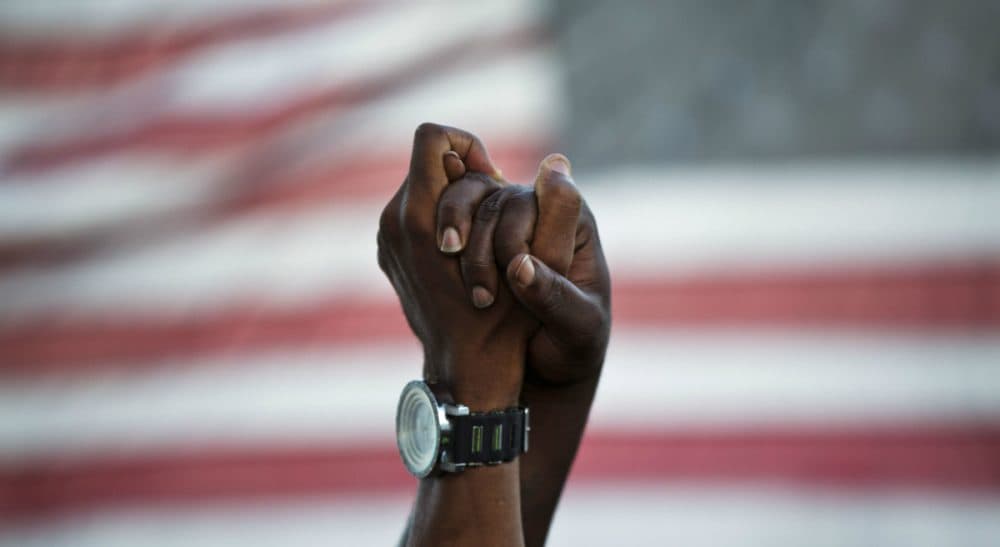Advertisement
What Do We Relinquish When We Say 'I Forgive You'?

Near the end of his startlingly earnest blog, Dylann Roof writes, “To take a saying from my favorite film, 'Even if my life is worth less than a speck of dirt, I want to use it for the good of society.' ”
While hiding under a boat after his gunfight with the Watertown police, Dzhokhar Tsarnaev writes in a blood-stained, bullet-riddled note, “The U.S. Government is killing our innocent civilians … I can’t stand to see such evil go unpunished, we Muslims are one body, you hurt one you hurt us all … Now I don’t like killing innocent people it is forbidden in Islam but due to said [bullet hole] it is allowed.”
We forgive to find peace, or at least a release from a constant, corrosive rage -- however righteous -- that would otherwise consume us.
Two young men. Both 21 years old, with heartfelt, if grandiose beliefs. Both feel their own horrific actions to be demonstrations of solidarity with the oppressed, as difficult sacrifices that they’re making for the greater good.
And the painful symmetry doesn’t end there. In a Charleston courtroom, we heard family members of his victims forgive an apparently unrepentant Dylann Roof. In a Boston courtroom, the apology of an apparently remorseful Dzhokhar Tsarnaev has generated little in the way of forgiveness from those injured by his actions.
There are parallels, but perhaps not equivalency. Roof’s targeting of an AME church was deliberate; he was seeking out black people to kill, and seemed eager to do so in a setting that sociologist and Baptist minister Michael Eric Dyson describes in a New York Times opinion piece as “a breeding ground for leaders and movements to quell the siege of white racist terror.” Tsarnaev’s targeting of the marathon was symbolic; he embraced the randomness of the suffering he was about to impose. Roof’s hateful mission was to restore segregation and white political and economic supremacy (not that it’s been lost), to celebrate and propagate racism directed at African-Americans and at Jews (who he blamed for “agitation of the black race.”) It was to start a war. Though equally merciless, Tsarnaev’s misguided mission was to stop one.
So is one more worthy of mercy than the other? And are those expressing forgiveness kinder or more spiritually evolved than those who don’t, or simply more acquiescent?
Advertisement
Dyson disputes the latter interpretation. “In a country where black death is normal, even fiendishly familiar, black love is an unavoidably political gesture,” he argues. Still, I wondered if the “I forgive you” from Nadine Collier (daughter of one of the Charleston victims) was just a ramp up to what she really meant, which is “May God forgive you, because I can’t.” Or was it less an expression of forgiveness than of dignity, an assertion to Roof that while he may be driven by blindness and primal hate, she refused to stoop to that level.
As the internal and public discussion barrels on, I’ve begun to revisit what forgiveness means. Etymologists cite its origin in the Old English word forgiefan, which means “give, grant, allow; remit (a debt), pardon (an offense), also give up …”
Perhaps the people who can’t or won’t forgive Tsarnaev see doing so as a surrender. But regardless of whether the victims forgive them, Roof and Tsarnaev will be punished, most likely executed. Perhaps they see it as forgetting. But forgiveness does not deny grief; it invites it in. So what are the forgivers — the Charleston families or the marathon victim who expressed her relief at hearing Tsarnaev’s apology — relinquishing?
The more I listen to the passionate debate on this topic, the more I think that “I forgive you” has little to do with the transgressor. We forgive to find peace, or at least a release from a constant, corrosive rage — however righteous — that would otherwise consume us. Thankfully, I have few relationships in my own life that require reconciliation. But when I think about one that does, I realize that for me, saying “Forgive me” or “I forgive you” is essentially saying “I want things to be better between us.” It is an expression of hope.
we have to find our way into the hearts of the perpetrators and help disentangle their self-perceived altruistic impulse from its twisted scaffolding.
But now my phone has just buzzed and news about the latest terrorist attacks in France, Kuwait and Tunisia has come streaming in. And despite what I’ve just written, what my idealized self has just written, I feel nothing but horror and rage. I don’t feel capable of hope or of forgiveness.
Still, I don’t feel ready to respond in kind, to join the calls of some to behead the beheaders. I don’t think that will stop the madness. Somehow — and I don’t know how — we have to find our way into the hearts of the perpetrators and help disentangle their self-perceived altruistic impulse from its twisted scaffolding. Doing so is not an act of submission, but an assertion of our humanity and theirs -- the very humanity that racists and terrorists deny in order to do what they do.
